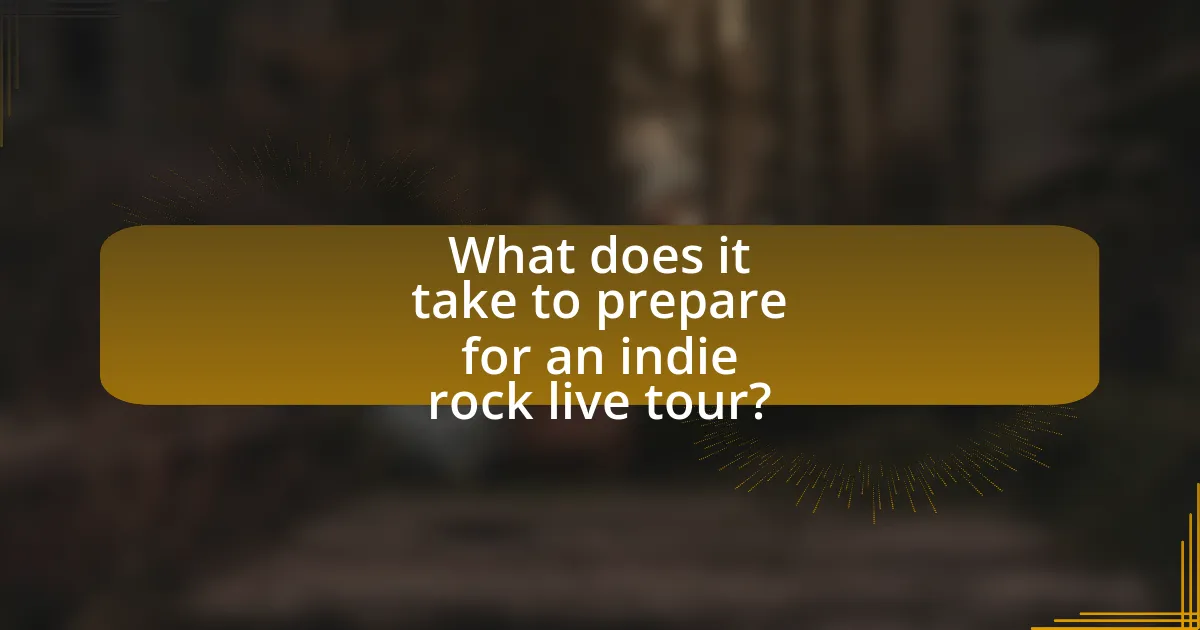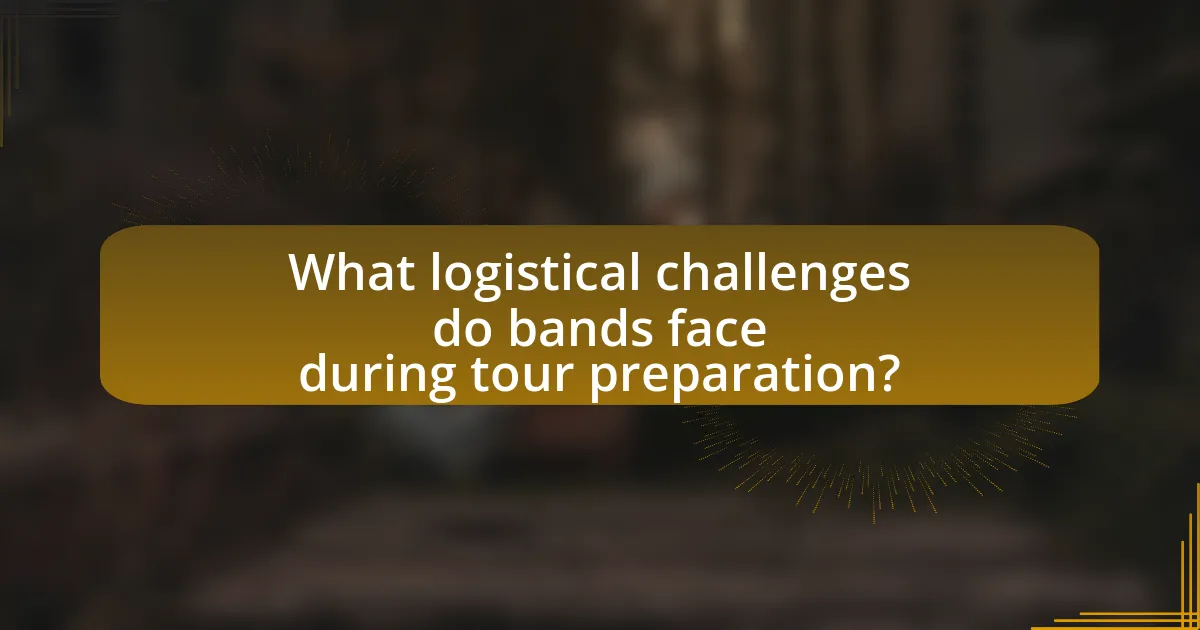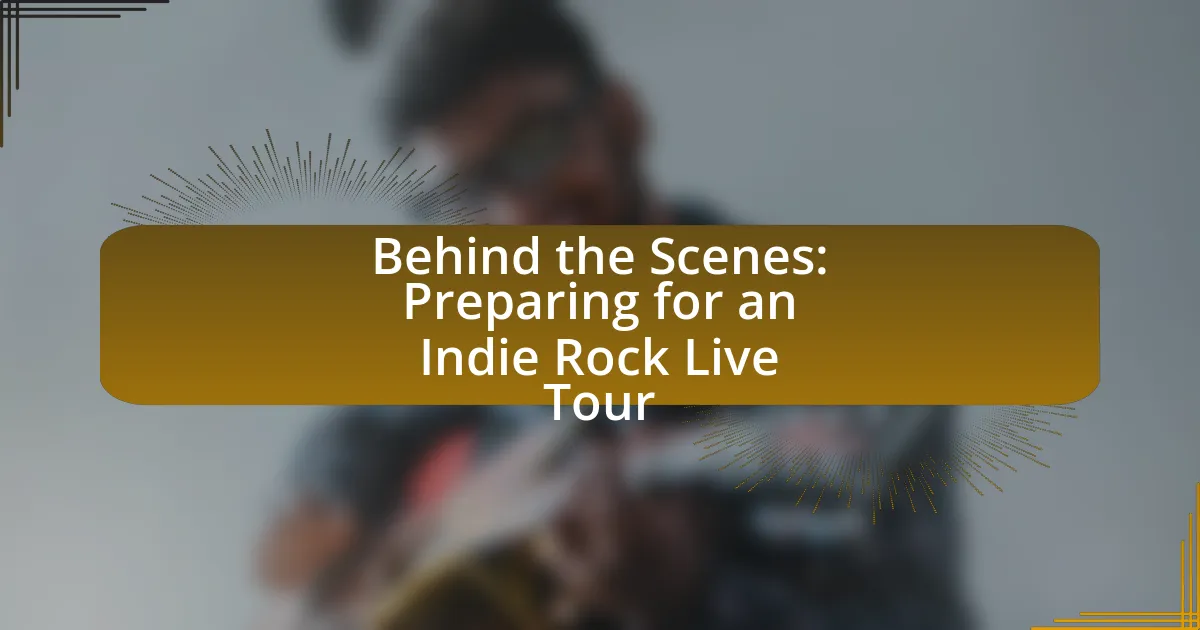The article focuses on the essential preparations required for an indie rock live tour, detailing the meticulous planning involved in budgeting, venue selection, transportation, and accommodations for the band and crew. It explores how bands choose suitable venues based on factors like location, capacity, and audience demographics, and emphasizes the importance of effective marketing strategies to enhance ticket sales and audience engagement. Additionally, the article discusses logistical challenges, crew management, and best practices for maintaining performance quality and health during tours, providing insights into common pitfalls and lessons learned from past indie rock tours.

What does it take to prepare for an indie rock live tour?
Preparing for an indie rock live tour requires meticulous planning and organization. Key steps include securing a tour budget, booking venues, arranging transportation, and coordinating accommodations for the band and crew. Additionally, creating a setlist, rehearsing extensively, and managing promotional activities are essential for a successful tour. Historical data shows that well-organized tours can increase merchandise sales by up to 30%, highlighting the importance of thorough preparation.
How do bands choose the right venues for their tour?
Bands choose the right venues for their tour by evaluating factors such as location, capacity, acoustics, and audience demographics. They analyze data on previous performances in specific areas, considering ticket sales and fan engagement to identify regions with strong support. Additionally, bands often prioritize venues that align with their genre and brand image, ensuring a suitable atmosphere for their music. For instance, indie rock bands may prefer intimate settings that foster a close connection with fans, while larger acts might opt for arenas that accommodate bigger crowds. This strategic selection process is crucial for maximizing attendance and enhancing the overall concert experience.
What factors influence venue selection for indie rock tours?
Venue selection for indie rock tours is influenced by factors such as location, capacity, acoustics, and local music scene engagement. The location is critical as it determines accessibility for fans and proximity to other tour stops, which can affect overall attendance. Capacity is essential to ensure that the venue can accommodate the expected audience size, balancing the potential for a sold-out show with the risk of underperformance. Acoustics play a significant role in the quality of the live performance, as venues with better sound systems enhance the audience experience. Additionally, the local music scene’s vibrancy can impact ticket sales, as venues in areas with a strong indie rock presence often attract more fans. These factors collectively guide artists and promoters in making informed decisions about where to perform, ultimately affecting the success of the tour.
How does venue capacity affect ticket sales and audience experience?
Venue capacity significantly influences ticket sales and audience experience by determining the availability of seats and the overall atmosphere of the event. Larger venues can accommodate more attendees, which often leads to higher ticket sales due to increased demand and visibility. For instance, a study by the National Endowment for the Arts found that events in larger venues tend to attract a broader audience, enhancing ticket sales potential. Conversely, smaller venues create an intimate setting that can enhance audience engagement and satisfaction, as attendees feel closer to the performers. Research indicates that 70% of concertgoers prefer smaller venues for the personal experience they offer, which can lead to repeat attendance and positive word-of-mouth promotion. Thus, venue capacity directly impacts both the financial success of ticket sales and the quality of the audience’s experience.
What role does budgeting play in tour preparation?
Budgeting plays a crucial role in tour preparation by determining the financial feasibility and allocation of resources for various tour-related expenses. Effective budgeting allows tour managers to outline costs such as transportation, accommodation, equipment rental, and marketing, ensuring that the tour remains profitable. For instance, a study by the Music Industry Research Association highlights that proper financial planning can increase the likelihood of a successful tour by up to 30%, as it helps in avoiding overspending and managing cash flow effectively.
How do bands estimate costs for an indie rock tour?
Bands estimate costs for an indie rock tour by analyzing various factors such as travel expenses, accommodation, venue fees, and equipment rental. They typically create a detailed budget that includes transportation costs, which can vary based on distance and mode of travel, as well as lodging expenses that depend on the number of band members and crew. Venue fees are calculated based on the size and location of the venue, while equipment rental costs are determined by the specific gear needed for performances. Additionally, bands often consider marketing expenses and merchandise production costs to ensure a comprehensive financial plan. This budgeting process is crucial for financial viability and is often informed by past tour experiences and industry benchmarks.
What are the common expenses associated with touring?
Common expenses associated with touring include transportation, accommodation, food, equipment rental, and marketing costs. Transportation expenses cover vehicle rentals, fuel, and tolls, which are essential for moving between venues. Accommodation costs involve hotel stays or other lodging arrangements for the band and crew during the tour. Food expenses account for meals for all members on the road, which can add up quickly. Equipment rental costs arise from needing sound and lighting gear, especially if the band does not own all necessary equipment. Lastly, marketing costs encompass promotional materials and advertising to attract audiences to the shows. These expenses are critical for budgeting and planning a successful tour.
How important is marketing and promotion for a successful tour?
Marketing and promotion are crucial for a successful tour, as they directly influence ticket sales and audience engagement. Effective marketing strategies, such as social media campaigns and targeted advertising, can increase visibility and attract a larger audience. For instance, a study by Eventbrite found that 70% of event attendees learned about events through social media, highlighting its role in reaching potential concert-goers. Additionally, promotional efforts can create buzz and anticipation, which are essential for maximizing attendance and revenue during the tour.
What strategies do indie bands use to promote their tours?
Indie bands use social media marketing, local partnerships, and grassroots outreach to promote their tours. Social media platforms like Instagram, Facebook, and Twitter allow bands to engage directly with fans, share tour dates, and create buzz through targeted posts and stories. Collaborating with local businesses, such as cafes and record stores, helps indie bands reach new audiences and gain credibility within the community. Additionally, grassroots outreach, including mailing lists and street teams, enables bands to connect with fans on a personal level, fostering loyalty and encouraging word-of-mouth promotion. These strategies are effective as they leverage existing networks and personal connections, which are crucial for indie bands operating with limited budgets.
How can social media impact tour visibility and ticket sales?
Social media significantly enhances tour visibility and ticket sales by providing a platform for direct engagement with fans and targeted marketing. Artists can share updates, behind-the-scenes content, and promotional materials, which increases awareness and excitement around their tours. For instance, a study by Eventbrite found that 93% of event organizers use social media to promote their events, leading to higher ticket sales. Additionally, social media algorithms favor engaging content, allowing posts about tours to reach a broader audience, thus driving ticket purchases.

What logistical challenges do bands face during tour preparation?
Bands face several logistical challenges during tour preparation, including scheduling conflicts, transportation issues, and equipment management. Scheduling conflicts arise when coordinating dates with venues, which can lead to overlapping commitments or last-minute changes. Transportation issues involve securing reliable vehicles for travel, managing routes, and ensuring timely arrivals at each location, which is critical for maintaining performance schedules. Equipment management includes the logistics of packing, transporting, and setting up musical instruments and sound gear, which requires careful planning to avoid damage and ensure functionality. These challenges are compounded by the need for effective communication among band members, crew, and venue staff to ensure a smooth tour experience.
How do bands manage transportation and equipment logistics?
Bands manage transportation and equipment logistics by utilizing a combination of dedicated tour managers, transportation companies, and detailed planning. Tour managers coordinate schedules, routes, and vehicle bookings to ensure timely arrival at venues. They often work with logistics companies that specialize in transporting musical equipment, ensuring that instruments and gear are securely packed and transported. Additionally, bands create detailed itineraries that outline travel routes, loading and unloading times, and equipment setup schedules, which helps streamline the process and minimize delays. This structured approach is essential for maintaining efficiency during tours, as evidenced by the fact that successful tours often rely on meticulous logistical planning to avoid costly setbacks.
What are the best practices for transporting musical gear safely?
The best practices for transporting musical gear safely include using proper cases, securing equipment during transit, and maintaining climate control. Proper cases, such as hard-shell or padded gig bags, protect instruments from physical damage. Securing equipment with straps or tie-downs prevents movement and potential breakage while in transit. Additionally, maintaining climate control is crucial, as extreme temperatures and humidity can damage sensitive electronic components and wooden instruments. These practices are supported by industry standards, which emphasize the importance of protecting musical gear to ensure longevity and optimal performance.
How do bands coordinate travel schedules between venues?
Bands coordinate travel schedules between venues by utilizing a combination of tour management software, detailed itineraries, and communication with local promoters. Tour management software, such as Bandsintown or TourSync, allows bands to input dates, locations, and travel logistics, ensuring all members have access to real-time updates. Detailed itineraries outline travel times, accommodations, and performance schedules, which are shared among band members and crew to maintain alignment. Additionally, communication with local promoters helps bands understand venue logistics and local traffic conditions, allowing for adjustments to travel plans as needed. This systematic approach ensures that bands can efficiently manage their time and resources while on tour.
What are the key considerations for crew and personnel management?
Key considerations for crew and personnel management in the context of preparing for an indie rock live tour include effective communication, role clarity, and conflict resolution strategies. Effective communication ensures that all team members are informed about schedules, responsibilities, and changes, which is crucial for smooth operations during the tour. Role clarity helps each crew member understand their specific duties, reducing overlap and confusion, which can lead to inefficiencies. Conflict resolution strategies are essential for addressing interpersonal issues that may arise, as a cohesive team is vital for the success of the tour. These considerations are supported by industry practices that emphasize the importance of structured team dynamics and clear operational protocols in live event management.
How do bands select and hire crew members for the tour?
Bands select and hire crew members for the tour through a combination of personal recommendations, industry connections, and interviews. Typically, bands rely on trusted contacts within the music industry to identify qualified candidates, ensuring that crew members have the necessary skills and experience. For instance, a sound engineer may be recommended by a fellow musician or a previous tour manager, which helps establish credibility. Additionally, bands conduct interviews to assess candidates’ technical abilities and compatibility with the band’s culture. This process often includes reviewing past work, checking references, and sometimes conducting trial runs during rehearsals to ensure the crew can effectively support the band’s needs on tour.
What roles are essential for a successful indie rock tour team?
A successful indie rock tour team requires several essential roles, including a tour manager, sound engineer, lighting technician, roadies, and a merchandise manager. The tour manager oversees logistics, schedules, and budgets, ensuring smooth operations throughout the tour. The sound engineer is responsible for audio quality during performances, while the lighting technician manages visual effects, enhancing the overall concert experience. Roadies handle equipment setup and breakdown, ensuring that everything runs efficiently. Lastly, the merchandise manager coordinates the sale of band merchandise, which is crucial for revenue generation. Each of these roles contributes significantly to the tour’s success by ensuring that both the band and the audience have a positive experience.
How do bands handle accommodations during the tour?
Bands handle accommodations during the tour by coordinating with tour managers to secure lodging that meets their needs. Tour managers typically research and book hotels or rental properties in advance, considering factors such as proximity to venues, budget constraints, and the number of band members and crew. For example, many bands prefer to stay in hotels that offer amenities like breakfast and Wi-Fi, which can enhance their comfort and productivity while on the road. Additionally, some bands may opt for group accommodations, such as renting a house, to foster a communal atmosphere and reduce costs. This logistical planning is crucial for maintaining the band’s well-being and ensuring a smooth touring experience.
What types of lodging are most suitable for touring bands?
Touring bands are most suitably accommodated in budget-friendly hotels, hostels, and rental homes. Budget-friendly hotels provide essential amenities and often include breakfast, which is beneficial for bands on tight schedules. Hostels offer shared accommodations at lower costs, fostering a communal atmosphere that can be advantageous for team bonding. Rental homes, such as those found on platforms like Airbnb, allow bands to stay together in a more private setting, often with kitchen facilities that enable meal preparation, reducing food expenses. These lodging types cater to the financial constraints and logistical needs of touring bands, ensuring comfort and convenience while on the road.
How can bands ensure comfortable and affordable stays on tour?
Bands can ensure comfortable and affordable stays on tour by booking accommodations in advance and utilizing group discounts. Early bookings often lead to lower rates, and many hotels offer special rates for musicians or groups, which can significantly reduce costs. Additionally, bands can consider alternative lodging options such as hostels, vacation rentals, or staying with local fans, which can provide both comfort and savings. Research indicates that planning ahead and exploring various lodging options can save bands up to 30% on accommodation expenses during tours.

What are the best practices for a successful indie rock live tour?
The best practices for a successful indie rock live tour include thorough planning, effective marketing, and strong audience engagement. Planning involves selecting appropriate venues, scheduling dates that avoid conflicts with major events, and ensuring logistical details like transportation and accommodations are organized. Effective marketing utilizes social media, email newsletters, and local press to promote shows, often leveraging platforms like Instagram and Facebook to reach target audiences. Audience engagement is crucial; interacting with fans through meet-and-greets, live Q&A sessions, and exclusive content can enhance loyalty and attendance. These practices are supported by industry data showing that well-promoted tours can increase ticket sales by up to 30%, highlighting the importance of strategic marketing and fan interaction in driving tour success.
How can bands create an engaging setlist for their performances?
Bands can create an engaging setlist for their performances by carefully selecting songs that balance crowd favorites with new material, ensuring a dynamic flow throughout the show. This approach keeps the audience invested and energized, as seen in studies showing that varied setlists can enhance audience engagement and satisfaction. For instance, a survey conducted by the Concert Industry Consortium found that 78% of concertgoers prefer a mix of well-known hits and fresh tracks, indicating that this strategy effectively captivates diverse audiences. Additionally, bands should consider the pacing of their setlist, alternating between high-energy songs and slower ballads to maintain emotional engagement, which has been supported by performance analysis in live music studies.
What factors should be considered when curating a setlist?
When curating a setlist, factors such as audience demographics, song popularity, flow and pacing, and thematic coherence should be considered. Audience demographics influence song selection based on age, preferences, and cultural background, ensuring the set resonates with listeners. Song popularity, determined by streaming data and previous concert feedback, helps prioritize tracks that engage the crowd. Flow and pacing are crucial for maintaining energy levels throughout the performance, balancing high-energy songs with slower ones to create an engaging experience. Thematic coherence ensures that the setlist tells a story or conveys a specific message, enhancing the overall impact of the performance.
How does audience feedback influence setlist choices?
Audience feedback significantly influences setlist choices by providing artists with insights into which songs resonate most with their fans. This feedback can be gathered through various channels, such as social media interactions, live performance reactions, and audience surveys. For instance, artists often analyze setlist data from previous shows to identify frequently requested songs or tracks that generate the most enthusiasm during performances. Additionally, platforms like Spotify and YouTube offer metrics on song popularity, further guiding artists in their selection process. By incorporating audience preferences, artists can enhance the concert experience, ensuring that the setlist aligns with fan expectations and maximizes engagement.
What tips can help bands maintain their energy and performance quality on tour?
To maintain energy and performance quality on tour, bands should prioritize proper rest, hydration, and nutrition. Adequate sleep is essential for recovery, as studies show that sleep deprivation can significantly impair cognitive and physical performance. Hydration is crucial, as even mild dehydration can lead to fatigue and decreased stamina. Additionally, consuming balanced meals rich in carbohydrates, proteins, and healthy fats supports sustained energy levels during performances. Regular warm-up exercises before shows can also enhance vocal and physical performance, reducing the risk of injury. These strategies collectively contribute to a band’s ability to deliver high-quality performances consistently throughout a tour.
How can bands manage their health and well-being while touring?
Bands can manage their health and well-being while touring by prioritizing proper nutrition, regular exercise, adequate sleep, and mental health support. Maintaining a balanced diet helps sustain energy levels and supports immune function, which is crucial during the physically demanding schedule of touring. Regular exercise, even in short bursts, can alleviate stress and improve mood, while ensuring adequate sleep is essential for recovery and cognitive function. Additionally, mental health support, such as access to counseling or mindfulness practices, can help bands cope with the pressures of touring. Research indicates that musicians face higher rates of anxiety and depression, making mental health resources vital for overall well-being during tours.
What strategies can help bands stay motivated and focused during long tours?
Bands can stay motivated and focused during long tours by implementing structured routines, setting achievable goals, and maintaining open communication. Structured routines help establish a sense of normalcy amidst the chaos of touring, allowing band members to manage their time effectively and prioritize rest and practice. Setting achievable goals, such as daily performance targets or personal milestones, fosters a sense of accomplishment and keeps morale high. Open communication among band members ensures that everyone feels supported and can address any issues that arise, which is crucial for maintaining a positive group dynamic. Research indicates that effective communication and goal-setting are key factors in team motivation and performance, as highlighted in studies on group dynamics in high-pressure environments.
What common pitfalls should bands avoid when preparing for a tour?
Bands should avoid inadequate planning when preparing for a tour. Insufficiently organizing logistics, such as transportation, accommodation, and scheduling, can lead to missed performances and increased stress. Additionally, neglecting to budget properly can result in financial strain, as many bands underestimate costs related to travel, food, and equipment. Failing to communicate effectively within the band and with venues can also create misunderstandings, impacting performance quality and audience experience. Lastly, overlooking the importance of rehearsals can diminish the band’s overall performance, as practice is crucial for cohesion and confidence on stage.
How can poor planning impact the overall success of a tour?
Poor planning can significantly undermine the overall success of a tour by leading to logistical failures, financial losses, and negative audience experiences. For instance, inadequate scheduling may result in missed performances or conflicts with venues, which can diminish ticket sales and audience turnout. Additionally, insufficient budgeting can cause overspending on essentials like transportation and accommodations, leading to financial strain on the tour. A study by the Event Marketing Institute found that 70% of event organizers cite planning as a critical factor in achieving successful outcomes, highlighting the importance of thorough preparation in ensuring a tour’s success.
What lessons can be learned from past indie rock tours?
Past indie rock tours reveal several key lessons that can enhance future touring experiences. One significant lesson is the importance of meticulous planning and budgeting; for instance, the 2010 tour of the band Arcade Fire demonstrated that detailed financial forecasting can prevent overspending and ensure profitability. Additionally, effective communication among band members and crew is crucial, as evidenced by the challenges faced by the band Death Cab for Cutie during their tours, where miscommunication led to logistical issues. Furthermore, engaging with local audiences through social media and community events has proven beneficial, as seen in the success of the band Vampire Weekend, which fostered strong local connections that boosted ticket sales. These lessons underscore the necessity of preparation, communication, and audience engagement in the indie rock touring landscape.
